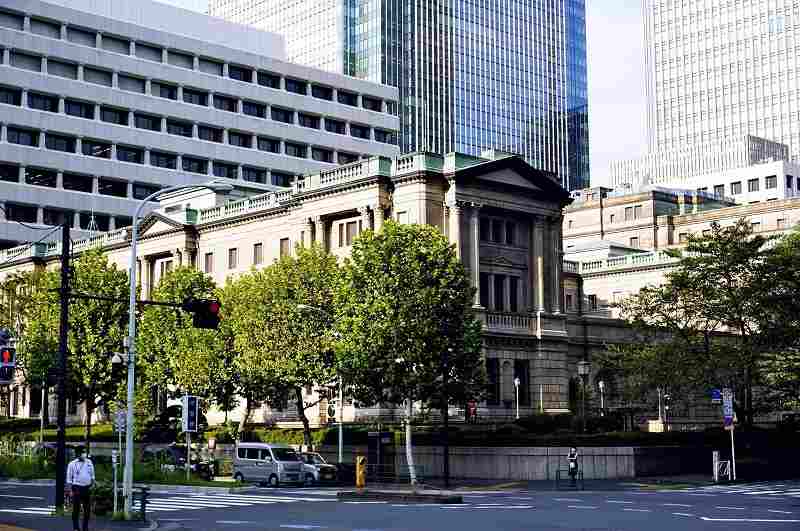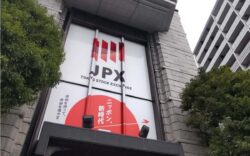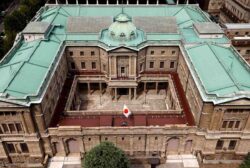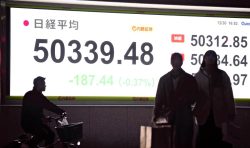
The Bank of Japan head office in Tokyo
13:03 JST, April 28, 2022
TOKYO (Reuters) — The Bank of Japan on Thursday maintained its massive stimulus program and a pledge to keep interest rates ultralow, reinforcing its resolve to support a fragile economy even as sharp rises in raw material costs push up inflation.
The central bank also said it will offer to buy unlimited amounts of 10-year government bonds to defend an implicit 0.25% cap around its zero target every market day, unless it becomes clear such an offer would draw no bids.
“The BOJ expects short- and long-term policy interest rates to remain at their present or lower levels,” the bank said in a statement, leaving unchanged the guidance from the previous meeting in March.
The BOJ’s commitment to its zero-rate program puts it at odds with major economies that are shifting toward tighter monetary policy, although inflation in Japan is expected to creep up towards the central bank’s 2% target.
In fresh quarterly forecasts, the central bank projected core consumer inflation to hit 1.9% in the current fiscal year that ends in March 2023.
It then expects inflation to moderate to 1.1% in fiscal 2023 and 2024, a sign it sees current cost-push price rises as transitory.
As widely expected, the BOJ left unchanged its -0.1% target for short-term interest rates and a pledge to guide the 10-year bond yield around 0%.
Speculation has been rife the BOJ could allow long-term rates to rise more or tweak its dovish policy guidance to combat yen declines, as some lawmakers fret further falls in the currency could hurt the economy by inflating import costs.
Markets are focusing on Gov. Haruhiko Kuroda’s remarks at his post-meeting briefing for clues on whether and how soon the BOJ could modify its dovish policy guidance.
Japan’s economic growth likely stalled in the first quarter and is seen only rebounding modestly in April-June, as caution over the pandemic and rising living costs hurt consumption.
Core consumer inflation, which hit 0.8% in March, is set to accelerate to around 2% from April, though the rise will be driven largely by rising fuel costs and the dissipating effect of past cellphone fee cuts — rather than from higher wages, or underlying demand.
Top Articles in Business
-

Prudential Life Insurance Plans to Fully Compensate for Damages Caused by Fraudulent Actions Without Waiting for Third-Party Committee Review
-

Narita Airport, Startup in Japan Demonstrate Machine to Compress Clothes for Tourists to Prevent People from Abandoning Suitcases
-

JR Tokai, Shizuoka Pref. Agree on Water Resources for Maglev Train Construction
-

KDDI Opens AI Data Center at Former Sharp Plant in Osaka Prefecture; Facility Will Provide Google’s Gemini AI Model for Domestic Users
-

Toyota Motor Group Firm to Sell Clean Energy Greenhouses for Strawberries
JN ACCESS RANKING
-

Japan Institute to Use Domestic Commercial Optical Lattice Clock to Set Japan Standard Time
-

Israeli Ambassador to Japan Speaks about Japan’s Role in the Reconstruction of Gaza
-

Man Infected with Measles May Have Come in Contact with Many People in Tokyo, Went to Store, Restaurant Around When Symptoms Emerged
-

Prudential Life Insurance Plans to Fully Compensate for Damages Caused by Fraudulent Actions Without Waiting for Third-Party Committee Review
-

Woman with Measles Visited Hospital in Tokyo Multiple Times Before Being Diagnosed with Disease

























